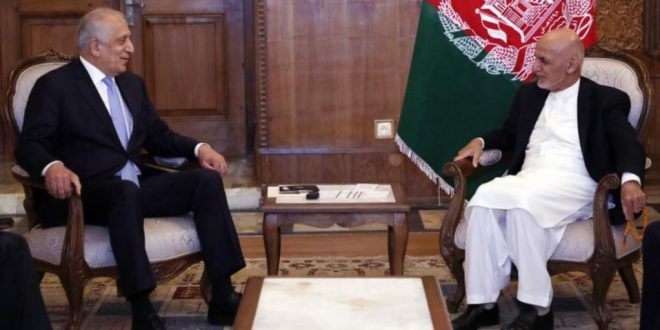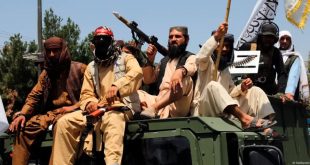
By Naser Sidiqee
RAND Corporation’s research is an opportunity for reflection on what a peace agreement might look like. It is also a source of ideas for the Afghan people and the government regarding possible results of a peace process.
However, the work, as claimed to have been produced on the basis of a comprehensive research and intensive consultations, it is nothing more than a bespoke product designed to provide solutions specific to the US’ as well as the Taliban’s interests. It does not present any prospect for peace and stability for the Afghan people.
The research’s methodology is also flawed in a number of ways. First and foremost, it fails to capture the perspectives and aspirations of the Afghan people. Although the views and insights of the peace process’s most influential stakeholders i.e. – officials inside and outside the US and Afghan governments – as well as experts from the most concerned regions of the world are seemingly solicited, the research provides insufficient evidence for having sought to better understand the context.
Moreover, the research seems to be led by experts with limited socio-economic as well as political understanding of Afghanistan thus failing to deliver an independent, however thought-provoking, proposal that can support better-informed decisions during a peace process.
It is expected that a high-caliber research on the Afghan peace process must deliver a range of macro, (global, regional, national and territorial) political as well as economic-focused analysis on prevailing conditions. Afghanistan must become a peaceful, stable and more prosperous country as a result of any peace agreement with the Taliban. How much peaceful and stable, must be the goal and focus of any peace process which this proposal demonstrates failure to craft.
In addition, the research does not sufficiently elaborate on the ability and willingness of regional and global players to confront international terrorism and their safe havens beyond Afghanistan’s borders. The issue of drug trade, which is integrated to the Taliban’s illicit economic activities, seems to have completely fallen out of favor in this research.
Proponents and advocates of democracy, republic, fundamental human rights, women’s rights and freedom of expression/thought are most likely to be hit the hardest by the proposed peace agreement as there is no [detailed] reference to it in the model agreement. Adding to the difficulties of implementing such an agreement, is the challenge of ensuring the “broad-based representation” of ethno-political groups in a future governance arrangement.
The least affected groups are the corrupt politicians and intolerant Taliban who have only solidified their grips on power over the last 18 years. As a result of any similar agreement, they are likely to [re]gain their political legitimacy for another generation or more.
From an institutional standpoint, the Afghan National Security and Defense Forces (ANDSF) will also be significantly affected, as the agreement proposes not just integration of the Taliban fighters into the ANDSF but reinstitution and reconfiguration of the Afghan National Army (ANA) and the Afghan National Police (ANP).
The main source of Afghanistan’s concern is that reinstituting and reconfiguring the ANDSF would not only undermine its supremacy over the Taliban who will retain their arms, but also reverse years of effort in trying to establish impartial and apolitical security institutions. Such a measure, only to appease the Taliban, would also alienate a generation of patriots who have been making the ultimate sacrifice for sake of their country and not partisan agendas. Another source of serious concern would be infiltration into the ANDSF of foreign agents among the Taliban.
Although this research provides a unique opportunity for looking into the role of regional and global players in determining the outcome of a political settlement in Afghanistan, recent developments in US-Iran relations, for example, demonstrate serious vulnerabilities of building a regional consensus.
Reason requires that when arguing “Iran will need to weight its disinterest in falling in step with US policy in Afghanistan against its interest in the stability of its neighbor”, this also be debated that Iranian officials would look back in time when they cooperated with the US in unseating the Taliban and were rewarded by inclusion in the “Axis of Evil” by President Bush.
Iranians claim to be particularly sensitive to their national pride; therefore they will probably look into more than just disinterest in US efforts and interest in a peaceful and stable neighbor. Thanks to President Trump’s withdrawal from the Joint Comprehensive Plan of Action aka the Iran Nuclear Deal and his “maximum pressure” campaign against Iran, which have brought the moderates under immense stress, he has limited the possibility of any such cooperation.
For a peace agreement to hold together, the international community must choose between their disinterest in a long-term [primarily economic and humanitarian but also if required military] engagement as well as addressing the issue terrorists’ safe havens and interest in ensuring peace and stability in Afghanistan.
The contemporary history of relations between the governments of Afghanistan and Pakistan are marked by the latter’s quest for establishing its dominance in Afghanistan. Long before the US intervention in 2001, the Afghans viewed Pakistan as their number one regional threat and it remains the conventional wisdom to date, especially after the resurgence of the Taliban.
Although the US’ presence in Afghanistan has certainly not encouraged Pakistan to abandon its efforts for turning Afghanistan into a client state, withdrawing in a manner put forth in this proposal would certainly present Islamabad with the opportunity to accelerate advancing its “strategic depth” policy.
By signing such an agreement, the world’s largest economy with its most powerful and well-funded army – the United States – will have confronted its defeat by no other than a small-time terrorist group. The US and its allies will also be exposed to higher risks related to international terrorism as the issue of terrorists’ safe havens beyond Afghanistan’s borders is reduced to the level of insignificance.
 Afghanistan Times
Afghanistan Times




